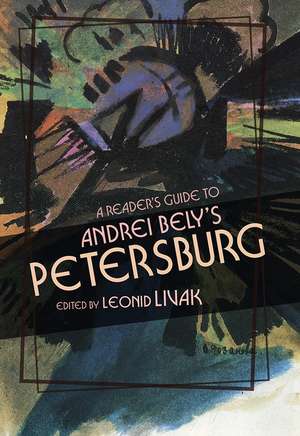A Reader's Guide to Andrei Bely’s "Petersburg
Editat de Leonid Livaken Limba Engleză Hardback – 14 ian 2019
Andrei Bely's 1913 masterwork Petersburg is widely regarded as the most important Russian novel of the twentieth century. Vladimir Nabokov ranked it with James Joyce's Ulysses, Franz Kafka's Metamorphosis, and Marcel Proust's In Search of Lost Time. Few artistic works created before the First World War encapsulate and articulate the sensibility, ideas, phobias, and aspirations of Russian and transnational modernism as comprehensively.
Bely expected his audience to participate in unraveling the work's many meanings, narrative strains, and patterns of details. In their essays, the contributors clarify these complexities, summarize the intellectual and artistic contexts that informed Petersburg's creation and reception, and review the interpretive possibilities contained in the novel. This volume will aid a broad audience of Anglophone readers in understanding and appreciating Petersburg.
Bely expected his audience to participate in unraveling the work's many meanings, narrative strains, and patterns of details. In their essays, the contributors clarify these complexities, summarize the intellectual and artistic contexts that informed Petersburg's creation and reception, and review the interpretive possibilities contained in the novel. This volume will aid a broad audience of Anglophone readers in understanding and appreciating Petersburg.
Preț: 476.07 lei
Preț vechi: 618.27 lei
-23% Nou
Puncte Express: 714
Preț estimativ în valută:
91.11€ • 98.93$ • 76.53£
91.11€ • 98.93$ • 76.53£
Carte tipărită la comandă
Livrare economică 23 aprilie-07 mai
Preluare comenzi: 021 569.72.76
Specificații
ISBN-13: 9780299319304
ISBN-10: 029931930X
Pagini: 248
Dimensiuni: 152 x 229 x 20 mm
Greutate: 0.54 kg
Editura: University of Wisconsin Press
Colecția University of Wisconsin Press
ISBN-10: 029931930X
Pagini: 248
Dimensiuni: 152 x 229 x 20 mm
Greutate: 0.54 kg
Editura: University of Wisconsin Press
Colecția University of Wisconsin Press
Recenzii
"The fifteen distinguished contributors do more than elucidate a world-class novel. They provide capsule courses on a spectrum of topics that mattered deeply to Andrei Bely but are obscure to many readers today: anthroposophy, neoKantianism, 'life-creation,' racial thinking, political terrorism. A path-breaking literary portal." —Caryl Emerson, Princeton University
"Succeeds in making a challenging modernist novel more accessible to nonspecialists. Students and fans of Bely's work at every level will appreciate this fine and informative critical companion to Petersburg." —Emily Johnson, author of How St. Petersburg Learned to Study Itself
Notă biografică
Leonid Livak is a professor in the Department of Slavic Languages and Literatures and the Centre for Jewish Studies at the University of Toronto. He is the author of Russian Émigrés in the Intellectual and Literary Life of Interwar France, The Jewish Persona in the European Imagination, and How It Was Done in Paris: Russian Émigré Literature and French Modernism.
Cuprins
Introduction
Leonid Livak
On Translating Petersburg
John Elsworth
Part One. The Intellectual Context
Revolutionary Terrorism and Provocation in Petersburg
Lynn E. Patyk
Petersburg and Modern Occultism
Maria Carlson
Petersburg and Russian Nietzscheanism
Edith W. Clowes
Neo-Kantianism in Petersburg
Timothy Langen
Petersburg and the Philosophy of Henri Bergson
Hilary Fink
Petersburg and the New Science of Psychology
Judith Wermuth-Atkinson
Petersburg and Contemporary Racial Thought
Henrietta Mondry
Petersburg as Apocalyptic Fiction
David M. Bethea
Part Two. The Aesthetic Context
Petersburg and Music in Modernist Theory and Literature
Steven Cassedy
Theatricality and Life-Creation in Russian Modernist Culture and in Andrei Bely’s Petersburg
Colleen McQuillen
Petersburg and Modernist Painting with Words
Olga Matich
Petersburg and Urbanism in the Modernist Novel
Taras Koznarsky
Petersburg and the Problem of Consciousness in Modernist Fiction
Violeta Sotirova
Aids for Reading and Studying Petersburg
An Annotated Synopsis
Leonid Livak
Recommended Critical Literature in English
Index
Leonid Livak
On Translating Petersburg
John Elsworth
Part One. The Intellectual Context
Revolutionary Terrorism and Provocation in Petersburg
Lynn E. Patyk
Petersburg and Modern Occultism
Maria Carlson
Petersburg and Russian Nietzscheanism
Edith W. Clowes
Neo-Kantianism in Petersburg
Timothy Langen
Petersburg and the Philosophy of Henri Bergson
Hilary Fink
Petersburg and the New Science of Psychology
Judith Wermuth-Atkinson
Petersburg and Contemporary Racial Thought
Henrietta Mondry
Petersburg as Apocalyptic Fiction
David M. Bethea
Part Two. The Aesthetic Context
Petersburg and Music in Modernist Theory and Literature
Steven Cassedy
Theatricality and Life-Creation in Russian Modernist Culture and in Andrei Bely’s Petersburg
Colleen McQuillen
Petersburg and Modernist Painting with Words
Olga Matich
Petersburg and Urbanism in the Modernist Novel
Taras Koznarsky
Petersburg and the Problem of Consciousness in Modernist Fiction
Violeta Sotirova
Aids for Reading and Studying Petersburg
An Annotated Synopsis
Leonid Livak
Recommended Critical Literature in English
Index
Descriere
An introduction to a complex but hugely influential Russian novel written on the eve of the First World War. Accessible essays explain how Petersburg articulated the sensibility, ideas, phobias, and aspirations of Russian and transnational modernism.
